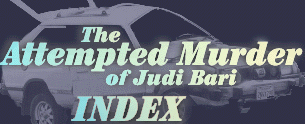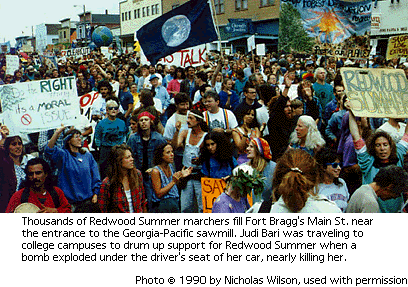
 |
|
NEW SETTLER: The last my readers know of you with regard to the bombing, you are in an Oakland hospital, near comatose. Outside, the FBI and the Oakland police are accusing you of the act of transporting the bomb that blew up your car as you were careening down a street in Oakland. I'd like you to begin with your recollection of the day you were bombed: why you were in Oakland? JUDI: I'm going to start the day before in Willits, because I think it is more logical that way... It was the eve of Redwood Summer and we were calling for people to come in from all over the country to engage in non-violent civil disobedience to stop the over-cutting; and the timber industry was mounting a campaign to portray us as violent, and to whip up hatred against us. This included my receipt of increasingly frightening death threats, and fake press releases that were being distributed not only to the press, but were being passed out in the lumber mills and on the logging jobs. The fake press releases had the Earth First! logo on them -- but they weren't written by us, and in contrast to what we were really saying, they were calling for violence and tree spiking. One of the fake press releases actually spelled Darryl's name wrong, so it was easy to prove it was fake -- as we were asserting -- yet these were still being distributed as if they were real, and treated by the press as if they were real. And perceived real by the increasingly-angered men who work in the industry. JUDI: We've documented all this stuff since. Louisiana-Pacific, for example, in at least one plant (I suspect in more) held a meeting -- on the clock, that workers were forced to attend -- where they passed out the fake press releases -- presented them as real -- and encouraged the workers (in the words of the plant manager) "to go to public meetings wearing your hard hat and work boots and role up your sleeves and sit down right next to one of them so they won't talk too freely." I know this because the union filed a grievance against L-P for making them listen to anti-Earth First! propaganda on company time.
| |
|
The companies
were very actively trying to discredit us. G-P canceled their mill tours because of the alleged "terrorist threat." That's how they were doing their part. MAXXAM (and I have actual proof from their internal company memos) MAXXAM distributed these fake press releases calling for violence to the press after they acknowledged privately that they were fake. L-P put a barbed wire fence around their Ukiah plant.
There was a whole bunch of things going on to portray us as terrorists
and make people afraid of us.
The bombing didn't happen in a vacuum.
Our reaction, though, was to try to head off the violence. We knew a lot of contract loggers -- the gyppos -- and we wanted to meet with them face-to-face and explain to them who we really were and to allay their fears and to work things out so that we wouldn't have to face violence that summer. We had asked Art Harwood to help us set up these meetings of local gyppo operators, in that he was one of the largest ones, and he did that and we had two mediated meetings with a paid mediator in Willits. There were some rank-and-file loggers, but mostly it was contract loggers, company owners -- Bill Bailey was there, he owns a big logger supply outfit in Laytonville. Jerry Philbrick was there. Tom Loop was there. And we had actually been making progress: first in humanizing each other -- in learning that each other were human beings, that we really had more in common than we thought; -- and then in allaying each other's fears. At the second meeting, we had reached an agreement that we called "The No First Strike Agreement": we had assured them that we had no intention of monkeywrenching their equipment, and they had said that they would not assault us if we don't. [laughs] So we really felt that we were making progress and that things were going well. So, that's where I was on Tuesday of the week I was bombed. That meeting was held in the evening. I left that meeting and went back to my house. Utah Phillips, who is a folk singer, Dakota Sid and Joanna Robinson were traveling with me. We spent the night at my house and then went down to Berkeley the next day where we were going to attend an organizing meeting for Redwood Summer. The organizing meeting was held at a Seeds of Peace house on California Street in Berkeley. The meeting was very long and there were lots of things to do -- setting up committees . . . Seeds of Peace? What are seeds of peace? Where have they been sown? JUDI: [laughter] Seeds of Peace is a group that was based in Berkeley -- I'm not even sure if they still are. They began at the Nevada Test Site actions -- and I believe in the earthquakes, also. They are a group of non-violent activists who feed people and run base camps and they have the capacities and the skills to feed many people. They had offered themselves to Redwood Summer, to help us run the base camps and help us run the non-violence trainings, so they were working in coalition with Earth First! By this time, Redwood Summer had become a coalition action. So they were going to play this principal role, and we had held that meeting at their collective house... And the meeting was very long, it didn't end until 11 p.m. or so, and after the meeting, Utah and Dakota went back to Nevada City, where they lived, and there were a bunch of people staying at the Seeds of Peace house, and then one of the people, Dave Kemnitzer, told me he had a spare bedroom nearby in Oakland, and did I want to use it? Well, there were many people sleeping on the floor at Seeds of Peace so I took up the offer of the spare bedroom and I left with Dave Kemnitzer and I went to his house.
| |
|
The next morning
Darryl came over to practice with me. Darryl and I were doing a tour of the colleges in northern California to recruit students to come to Redwood Summer. Actually, Darryl was doing them all; I was staying home a lot and organizing from there. But I was going to go to Santa Cruz -- which was where we were going to do our concert that evening. We had the most support in Santa Cruz. Two local kids who had grown up here -- Lisa Henry and Zack Stenz (Liz Henry and Anna Marie Stenberg's daughter and son) were the sponsors. They had publicized the event well and had a lot support for it. This was going to be our biggest gig ...
I need to ask you about your personal relationship with Darryl at this point because the nature of that relationship became part of the accusation against you -- that together, as lovers, you were not only going down to address a rally of students, you were also transporting a bomb. An electrical transmission tower in the Santa Cruz mountains had been blown up a month or two before and the FBI had tried to link Darryl with that ... JUDI: Actually, it was not blown up. That is part of the FBI disinformation. It was sawed down. There were three towers, actually, that were taken down, and they were done with a handsaw and with a cold chisel. They were done very low tech. There were no explosives involved. And it's very interesting the way you relate the story, because for people who know the story or know part of it, it is widely perceived that those tower lines were blown up, and in fact, they were not. And, it had happened a month earlier, and as I said at the time, I was home in bed with five witnesses. [laughs] I had nothing to do with this. It was Darryl who was being investigated JUDI: Darryl was not involved in it either. And actually, the FBI tried to implicate both of us; at the time, they were targeting me more than Darryl. And Darryl was not expected to be in my car when the bomb exploded. One of the reasons that I describe myself as the target of the bombing is not that I'm self-centered [laughing] -- although I may be -- but that Darryl was not expected to be traveling with me. We were traveling separately because I thought there was so much work that needed to be done yet at home, I couldn't afford to be gone for two weeks.
| |
|
Darryl and I
Ê had been officially "broken up" for several months by this time. But although we were broken up as lovers, we had remained friends and had remained organizing partners. We still associated with each other, but we were no longer a romantic couple.
And why was that? JUDI: It was really just personal reasons. We didn't just get along. We fought too much. He didn't get along with my children well enough, which was really an important thing for me. I think that if a man forces you to choose between your children and him, in my case, I'm going to choose my children every time. The things that were behind our break-up were really very personal. They didn't have to do with the organizing: So we were still organizing together. And we were still playing music together. But I wasn't going to go on the whole tour because I felt that I was needed at home too badly -- especially with this disruption campaign. We needed to be able to counter the idea that we were terrorists being spread in the community. I felt I needed to be home to answer these charges. On the other hand, I remember you being very fearful -- for the first time since I'd known you. JUDI: I was scared to death. It was terrifying. I considered going underground because I was so afraid from the death threats I was receiving. There were a whole series of them: and they were very elaborately done -- even artistic -- very well done. The scariest one was a photograph of me from a news story, with a rifle scope and cross-hairs drawn over my face and yellow ribbons stapled to it. Another one said: "Judi Bari get out, go back where you came from. We know everything. You won't get a second warning." -- that's an example. There was one called "Stompers," and it had a picture of these stomper logger boots and it said they wanted to "stomp the following low-life scum" and they named Darryl and Greg King and myself. and they said, "If you want to be a martyr, we'll happily oblige." |
 |  | |

Albion Monitor January 13, 1997 (http://www.monitor.net/monitor)
